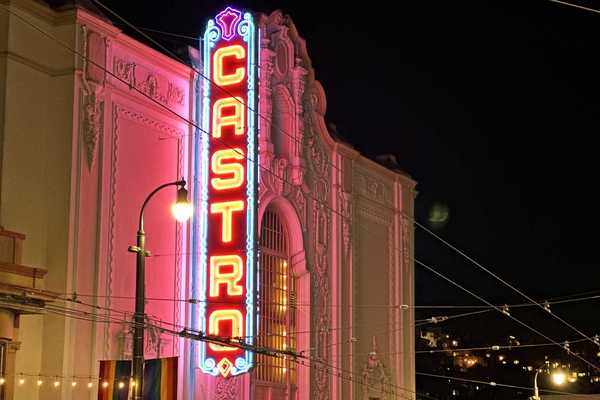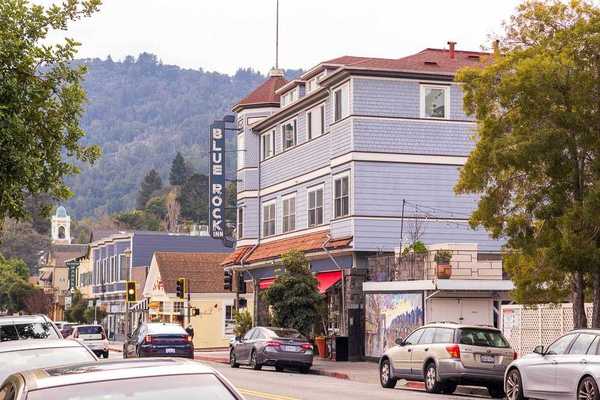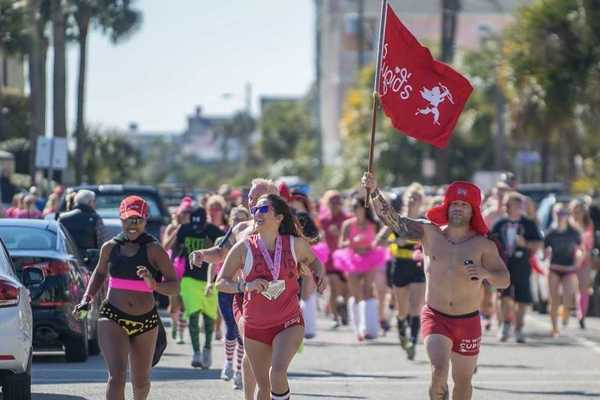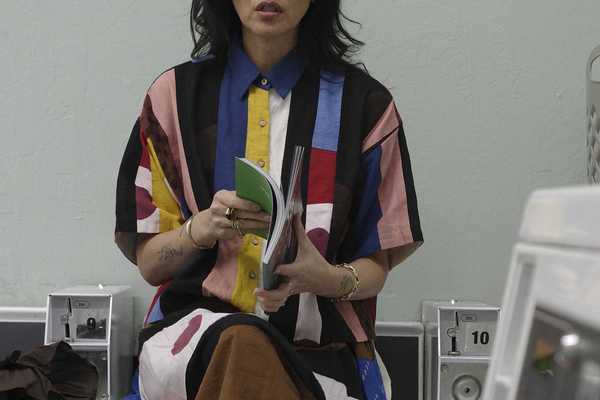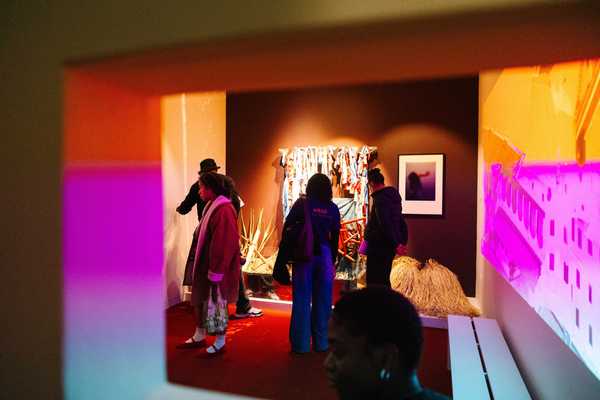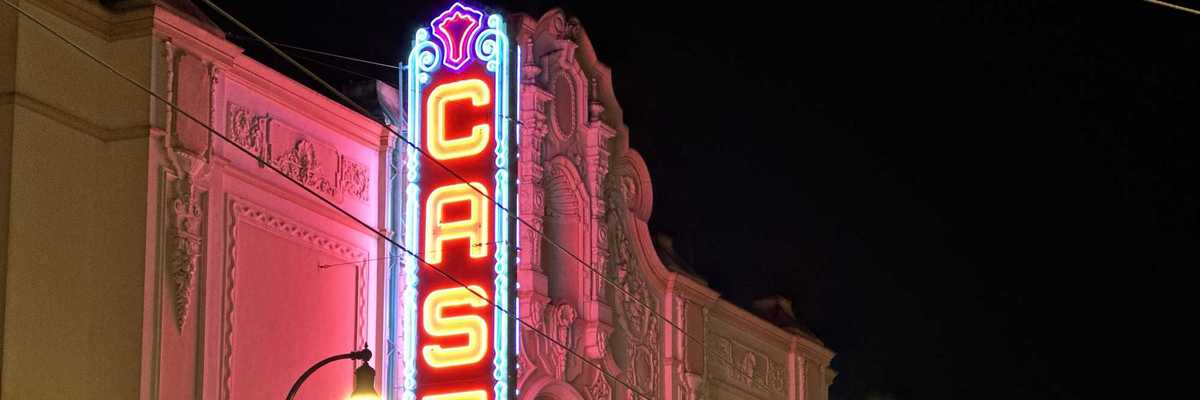I first beheld Fauxnique back in the fall of 2005. She was performing at a SoMa art gallery, at the book launch for K.M. Soehnlein's You Can Say You Knew Me When.
I was a young editor, pretty fresh out of a U-Haul to San Francisco from my hometown of Dallas, Texas; and Fauxnique (aka Monique Jenkinson) was not just any drag queen. She was a classically trained dancer who held the trailblazing title of Miss Trannyshack 2003 and, most notably (to me, at the time), she was a woman in the traditionally gay male role of impersonating an extravagantly made-up woman. Now y'all, we did not have those back in Texas.
All these years later, I don't remember much about her performance that night (though her later, effing-fabulous feminist production and performance of "The F Word" sticks with me), but her very existence dazzled me. She was irreverent, whip-smart, self-conscious and ballsy at once. And funny! This was the reason I had come to SF, to be in the place where boundaries were constantly broken and re-drawn by people who gave a fuck about what mattered and no fucks about the rest.
We can all say what we will (and we will!) about the ever-changing city and its takeover by tech money and homogenous bro culture, but San Francisco's queer culture is thriving and keeps on pushing the limits. Just look at how the old LGBT community, once summed up in a tidy four-letter acronym, has rolled forward on and on, like a Texas tumbleweed, to gather strength in numbers and letters. Today's LGBTQIA+ community has blown the lid off the exclusionary and is taking inclusivity to a whole new level, making space for a whole host of gorgeous nonconformists to live and be celebrated here.
Since Jenkinson became the first cisgender woman to be crowned a pageant-winning drag queen, cisgender drag queens have become a thing (hi, Victoria Scone of Drag Race UK). The artist, choreographer, performer, and writer has appeared on international stages and is anticipating the January 2022 release of her truly original memoir, Faux Queen: A Life in Drag.
Later this month, her publisher, Amble Press—the new queer imprint of Bywater Books—will be hosting a reading during Litquake's closing night Lit Crawl of local queer authors. Jenkinson will be among them, joined by her friend of more than 20 years, author K.M. Soehnlein, whose second novel, incidentally, brought me to Fauxnique in the first place.
Soehnlein is an icon in queer and literary circles. His debut novel, The World of Normal Boys, which told the story of a queer kid's sexual awakening amid family tragedy, won a Lambda Literary Award and is now in its 10th printing. Next fall, Amble will publish his fourth book, Army of Lovers, an autobiographical novel about Soehnlein's own AIDS activism in the 1980s and '90s. (On a more personal note, the USF writing teacher also penned 7x7's August 2013 print cover story "More Than Meets the Eye," about another community icon, drag diva Juanita More.)
Since Jenkinson and Soehnlein go way back—he even reads her tarot cards—we tasked them with interviewing each other about their upcoming works and about life, art, and activism in SF. Below is a snippet of their recent conversation. Pull up a chair, then catch the pair at The Make-Out Room during Lit Crawl, on Saturday, October 23rd.

K.M. Soehnlein: Monique, you're a performance artist, and now you've written a book. Which is harder: standing on tiptoe for 30 minutes while the audience enters the theater, or editing your life into a coherent narrative?
Monique Jenkinson: Writing and editing, by far.
K.M.S.: What's hard about it?
MJ: Well, I've written a lot for performance, and I'm no stranger to delving deeply, but I've never done writing that's demanded this level of delving.
K.M.S.: What are you delving into?
MJ: Faux Queen is a memoir about drag. I delve into how I ended up becoming a pageant-winning drag queen—the long, twisty road to get there—into my ballet training, which is a form of drag and, of course, playing dress-up as a kid. I delve into issues around the body, which drag helped me resolve. And into friendship between me and gay men.
Does writing help you figure out what you think?
K.M.S.: Yes. Writing puts thoughts into words. Army of Lovers is an autobiographical novel about my time as an AIDS activist with ACT UP and Queer Nation in the late '80s and early '90s. I've had lots of time to think back on those years, trying to figure out how to create a character who could grapple with the things that I was grappling with at the time—what effect the AIDS activist movement had on a young guy like me who was HIV-negative, entering into a world full of people fighting for their lives. Why did I do that? What did I learn from it?MJ: Did you figure out why you did it?
K.M.S.: It comes down to I was a young person who was fired up politically and this was the most important political issue of my time. It was my community, and I wanted to be part of it.
Okay. Question for you: The idea that a cisgender woman can excel as a drag queen is still unexpected in some places, though it's been going on in San Francisco for decades. Do you think the times have finally caught up to you and your sister faux queens?
MJ: Maybe? The club I entered embraced women into their drag queen fold. Everyone was playing with the performance of gender in different ways. Now we have Victoria Scone on Drag Race UK, which is an indication that the world is catching up. I'm curious how people are responding to her on the show and how it's being edited.
K.M.S.: Drag Race has spawned a legion of young cisgender girls who want to do drag.
MJ: Oh, I have heard from a lot of them over the years, and I say, "go for it." The liberty to play with femininity is anyone's to claim.
The queer kids right now seem very into their LGBTQ+ history. What kind of responsibility do you feel as someone who was there?
K.M.S.: The younger generation is very curious and interested in what older generations lived through. I'm interested in talking to those kids. In the 10 years it took me to write Army of Lovers, a couple of important documentaries about AIDS activism have come out, plus nonfiction books like Sarah Schulman's Let the Record Show and Peter Staley's Never Silent. I'm glad to be part of that wave. As a novelist, I'm interested in the emotional experience. I'm not a documentarian or historian. I take artistic liberties. I think we need to tell a lot of stories in a lot of different ways to teach the children.
MJ: Absolutely. I feel a tremendous amount of responsibility because my memoir contains so many other people's stories. Artists need a disclaimer, even when they're writing memoir, that it's always through a subjective lens. I'm also interested in the emotional and bodily experience of times and places, as opposed to hard facts. Hopefully I get things "right enough."
K.M.S.: Yeah, we live in a world where people are obsessed with pointing out whether you got it right or wrong, so every artist and writer who puts things out into the world is going to have to contend with that noisy dialogue. Good luck, girl.
MJ: And you, Mary. Goddess, give us strength.
K.M.S.: You came of age at a backlash time when there was a reluctance to embrace the word "feminism," but younger generations are embracing, expanding, and redefining it. Do you feel hopeful about the future for women artists in our patriarchal dumpster fire of a culture?
MJ: Girl, I do feel hopeful. My feminism holds the possibility for us to come together in glorious difference and intersectionality. There are moments when I feel divided and conquered and lose hope in the future of feminism. But having just seen the shows that are up right now in big institutions—Joan Mitchell at SFMOMA, the Judy Chicago retrospective at the de Young, the incredible Wangechi Mutu at the Legion of Honor—I just feel my feminist artists' pantheon all around. I'm proud to be a feminist making art.
K.M.S.: I love that.
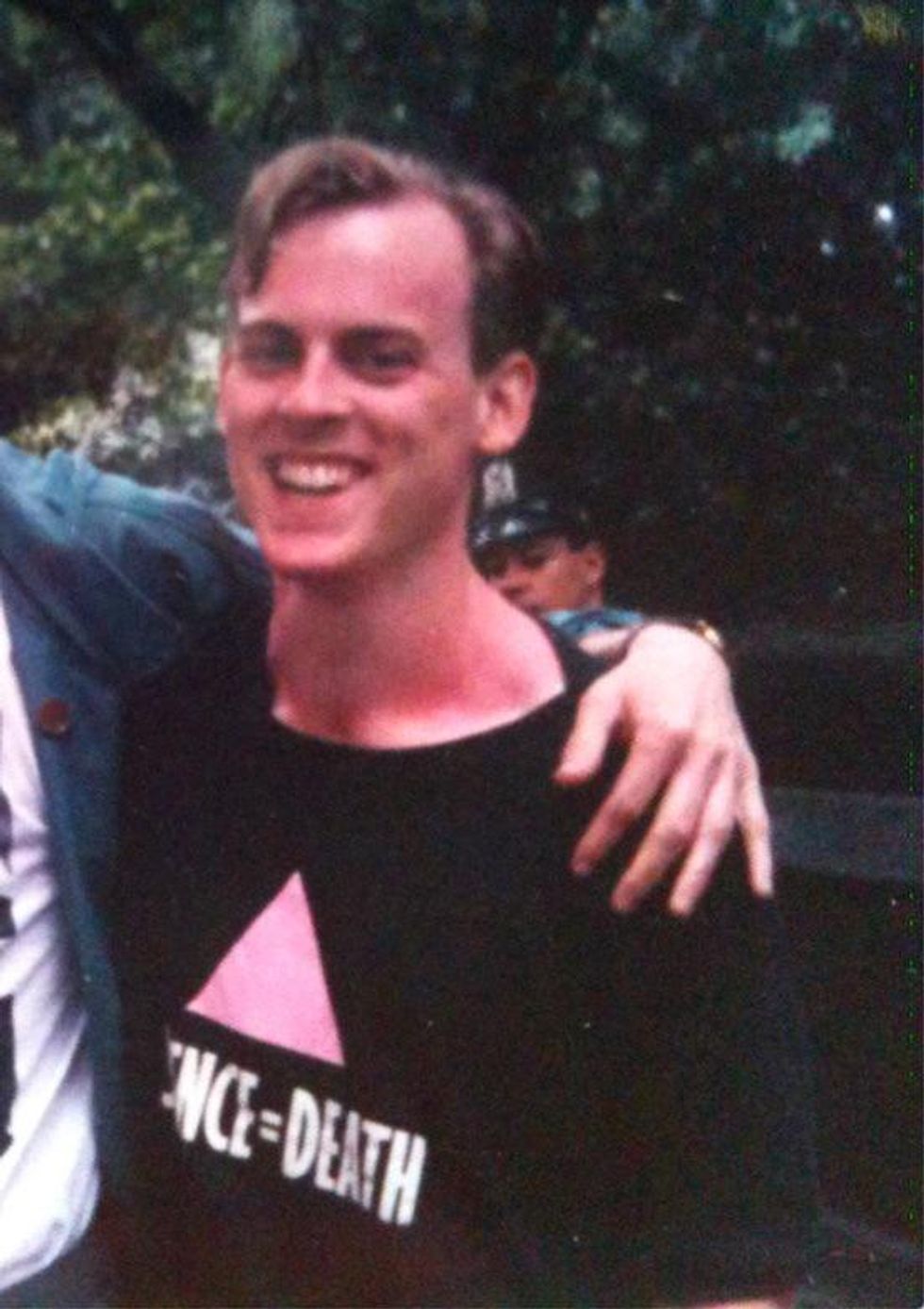
MJ: How do art and activism intersect for you?
K.M.S.: When I say 'activism" I mean the kind that shaped me, which is direct action, nonviolent civil disobedience: a movement that has a vision for change, comes up with demands, and then enacts interventions in public spaces, like people getting arrested to shift the public dialogue. That's not what art does. Art channels the imagination into communication. When I'm writing about activism, I'm not doing activism. I'm using imagination, craft, artistry, etc to produce something that you can experience, so that your imagination gets engaged. The challenge for me was to write about activism in a way that was exciting not didactic, not polemical, to paint a picture in the reader's mind or a feeling in their gut of what it's like to be at a demonstration and what it's like to be arrested in an act of civil disobedience.
MJ: Your description of writing a group scene feels to me, as a choreographer, like choreography.
K.M.S.: It is. You gotta move the bodies around on the page.
I remember when you hosted a drag night of Literary Heroines. Which literary heroines did you bring to life on stage?
MJ: Ha! I first proposed it to Heklina, who said "No, absolutely not. I'm a businesswoman!" Years later, the queens at club Some Thing asked me to co-host and I said "how about literary heroines" and they said "Great." I realized my dream of portraying three suicidal women writers. I started as Virginia Woolf, drowned myself, came back as Sylvia Plath, stuck my head in a cardboard oven, came back as Anne Sexton and turned on the fake gas. I thought about a hopeful ending as the eternal Joan Didion, but it didn't fit.
K.M.S.: That reminds me of the time I brought a friend to the pageant, she was a bit older than me, a mother, not a regular in the clubs, and that night one of the drag queens gave herself an abortion on stage. I was worried what my friend would make of that, but she thought it was amazing. She said, "Drag takes every difficult thing and adds humor to it." That's one definition of performance drag, right?
MJ: Absolutely. It's liberating and can be troubling and problematic, but it does the work of the clown, taking something that might be sacred and treating it with irreverence, making it a little profane. Just slap a wig on it. There was something redemptive in my Literary Heroines number. I wasn't really making fun of it. My intention was to honor.
So, speaking of literary heroines, let's do a lightning volley from the famous Proust Questionnaire.
K.M.S.: I love a Proust questionnaire moment. What's your idea of happiness?
MJ: Being in the ocean under the water.K.M.S.: Hi, Virginia Woolf.
MJ: But living to tell the tale. What do you appreciate most about your friends?
K.M.S.: Honesty and laughter. What's your idea of misery?
MJ: A hoarder house! What is your chief characteristic?
K.M.S.: Resting Intense Face. I have a furrowed brow even when I'm relaxed.
MJ: You know they have a botulism toxin for that.
K.M.S.: I'll get on the phone with my Kaiser provider. Who are your favorite authors?
MJ: Wayne Koestenbaum. Maggie Nelson, Zadie Smith. So many more. What's your favorite flower?
K.M.S.: Lilac. There was a lilac bush in my front yard where I grew up, and the smell just transports me to a beautiful happy place. You can't get them in the Bay Area and it kills me. Every year, they pop up at Whole Foods for like a week, but as soon as you bring them home, they die.
Who are your art heroes?
MJ: Marilyn Minter, Wangechi Mutu, Cindy Sherman, Kara Walker, Sandra Bernhard, Judy Chicago. And there's a huge number that I'll totally forget and be killing myself over, but that's fine.
And what are you, my darling, doing for fun right now in this not-quite post-pandemic world of our lovely city?
K.M.S.: The pandemic has made me really appreciate small gatherings of people indoors, and I'm hanging on to that sweet intimacy. I'm also giving lots of tarot readings to people and that has been a source of great "woo"-joy for me.
MJ: I can give a plug for those tarot readings, which are amazing.
K.M.S.: Tarot With Karl. And what are you doing for fun in our not-quite post-pandemic world?
MJ: Oh, like you I have embraced some of the lessons of the pandemic. I love hanging out with people outdoors. As much as I love going to bars and drinking expensive cocktails, sometimes a $10 bottle of wine in the park with a friend beats a $17 cocktail in a bar. And I'm with you on the small gatherings, super sweet.
K.M.S.: One of the most fun times I've had in the last few months was right here in this living room with friends playing hearts. Just playing cards for hours, chattin' and scratchin' like cats.
MJ: I love it!
// "Voices From Amble Press: A New Queer Publisher" will take place during Lit Crawl, the culminating event for Litquake's 2021 festival; 5pm, Saturday October 23rd at The Make-Out Room, 3225 22nd St. (Mission). For more information, go to litquake.org.





